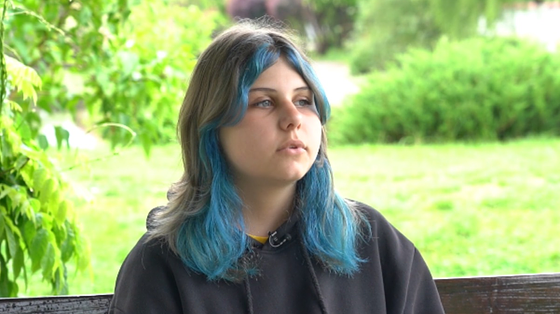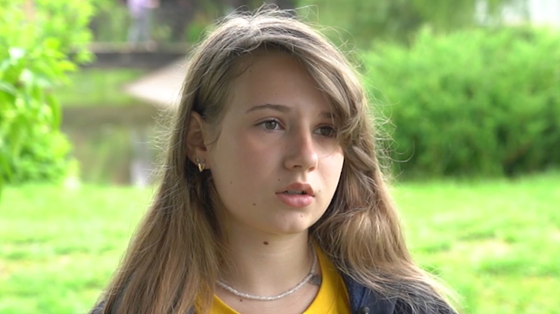“We thought that it would all end soon,” a Mariupol resident Inna Slitko says about the beginning of the armed hostilities in her hometown.
Before the war, she and her husband worked at Azovstal Steel Works. The war caught them at work. The woman’s flat was located in Skhidnyi micro-district of Mariupol city. For several days, they stayed at home and waited, hiding from the shelling in the house, and then the military asked them to move as heavy fighting was expected.
Inna took her three children and pets and they went to their grandfather who lived in the city centre. Then they moved to the bomb shelter in their workshop at Azovstal. They lodged there for a whole month, and it would have been very difficult to survive without the help of Azov Regiment soldiers.
On 26 March, the family left the steel works on foot and in six hours, hiding and running under shellfire, managed to leave the city. In a few days, with some good people’s help, they reached Berdiansk, and from there they escaped to Zaporizhzhia.

My husband and I worked at Azovstal. On the first day of the war, we were at work. We had a shortened working day – we were released home soon. When we came home, we thought that everything would end very soon, literally two or three days, and it would all be over. Well, it was not over. For several days, we stayed at home in Skhidnyi district, on the eighth floor (we live in a nine-storey building). Then the Ukrainian military, Azov Regiment, came and said that it was better to leave, because there would be a fighting and staying would be dangerous.
We took our three children and our cat and dog with us. We went to our grandfather, who lived near the square, and stayed at his place for three days, but then we left. The square came under very heavy shelling – this is the third section in Ordzhonikidzevskyi district.
There was a very intense fighting and so we left. Later we learned, just by chance, we received just one message on the phone about the “green corridor”; and we thought that it would be easier to be evacuated from Azovstal.
We stayed there and got stuck for a whole month, as we could not get out of there. It did not work out with the “green corridor” either.
We stayed in the bomb shelter for a whole month. Soldiers from Azov Regiment visited us and helped us a lot. We were nearly starving – so they brought us pasta and cereals, they also brought milk and sweets for children. Basically, they helped us a lot with food, and told us what was happening in the world, because we did not know anything at all, as we lived without telephone connection or Internet.
Then, on 26 March, we realized that we could not stay in the bomb shelter any longer. The rail beam in the workshop was a target for very heavy shelling. Almost nothing was left of the workshop, and cracks began to appear in the walls of the building. We had a diesel-engine power generator in the bomb shelter. There was a direct hit and the room was destroyed. Next to it was a room where we stayed for the night time, and a crack appeared in the wall of that room too.

So we realized that it was dangerous to stay there, we had to leave. In addition, we were very cold and ate poorly. We had just three cups of boiling water a day. We just realized that if we stayed in the bomb shelter for some more time, we would not be physically able to go on foot, because on 10-12 March Azov soldiers did not come to us anymore. The shelling was so intense then that we could not move around, we could not even go out to the toilet, or go out to breathe some fresh air.
Well, and then, on 26 March, we got up at 6 o’clock in the morning, took what we had with us, took our cat and dog, and went through the plant’s territory to the central security entrances in order to go out. We were supported a little by the Ukrainian military then, because there was an active enemy sniper somewhere and it was impossible to pass through the bridge. We stayed and waited for some 40 minutes, and most likely, this sniper was picked off so that we could pass.
The Ukrainian military wished us good luck, gave the children some chewing gums, because they did not have much food left either, and we walked off.
We managed to get out, with God’s help. We walked through the city and saw that there was a fighting in the streets. We also met our military on the way and asked them which street we could walk through so as not to be caught by heavy shelling. They advised us not to cross the street intersections, because there could be trip wires there, and the shelling in those areas was very strong. Well, we passed through the city. We walked for six hours. When shelling intensified, we wanted to hide somewhere. We tried one entrance to the building, but we could not really hide there.
And then, when we came out, some people whom we did not know at all helped us. We spent two nights in Yalta and then we found a car and came to Berdiansk. Some people helped us and we paid quite a small amount for the car. Then, people helped us to escape from Berdiansk too.
There was a woman, a local activist in Dmytrivka village, a very good woman. She picked up a lot of people from the road, and we lived at their school building. They gave us food. There was hot water and we could wash ourselves, stay warm and clean. She sheltered a large number of people and helped them so that they would not freeze on the side of the road.

Well, then we moved to Zaporizhzhia, where we have also lived for free. We lived in a hostel provided by Metinvest for more than a month. Now we are going to rent a flat. We want to sign a contract, and today we are moving into a three-room flat. Well, we have also been put on the reserve staff waiting list at Metinvest in order to get a job at Zaporizhstal. There are no open vacancies now, but we are waiting for some vacancy to appear, as we feel like it is enough to stay at home unemployed. We have been staying at home since February. We need a job, especially now, when we have to start everything from scratch.
My mother was injured there. She lived in her private house and their area was bombed very heavily from the first days of the war. And she probably could not properly assess the danger of the situation from the first days. The shelling ended, and she went out into the yard. Then, suddenly, the shelling resumed, and she had her leg injured, a torn wound caused by shell fragments. Her neighbours helped her. They took her to the hospital where she was operated on. She was injured on 28 or 29 February. In the hospital, an operation was performed without any delay.
But we could not visit her on the first day because there was heavy shelling. The next day, we managed to come and visit her, as we were at our grandfather’s place, near the square. It was quite close to the hospital, just a walk past some three residential blocks.
And when we came to visit the children’s grandmother, there were so many wounded patients that they were lying in the corridor. Then, the windows in the hospital were broken and it was cold inside. There was no water and no food; there were practically no medical staff left, and my mother died.
We were at our grandfather’s place then. We went out in order to find out something about the “green corridor”. Our grandfather is 92 years old, he stayed in the flat, he decided not to go anywhere. He did not survive the war either. His house was heavily bombed. He then went down to the bomb shelter (there were still some old Stalin-time buildings on Volodymyrska Street). The bomb shelters there were strong and good.
But people had no food, no one expected that they would have to stay in the bomb shelters for so long, and of course, they also had little food there. They ate very poorly. We do not even know on what date he died. We just talked to the neighbours and they said that he died and somebody buried him near the entrance to the building.
I believe that the war broke out only because of one person – Putin, and most likely, it can end when he dies. Well, I understand that one probably should not say so, but taking into account how much grief and how many troubles we have... Some people stayed in Mariupol and they firmly believe that it will be better for them in the so-called DPR (so-called Donetsk People’s Republic).

We talk to some people who stayed there, to some of our acquaintances. They believe that they will be provided with flats, that they will be paid money, and that 18-storey buildings will be built there. We listen to that and wonder what is in people’s minds, I don’t know. We have been deprived of everything: our home, our work, our family members… And then they give a bottle of water, some canned food – and people are happy. I don’t understand this. Well, maybe because of the grief they have experienced they want to believe in everything. Well, with such a future now… certainly, it is scary even to think of it.
My future is to get a job at Metinvest, and then it is not so bad. After all, there is some social protection there. And we submitted an application for the restoration of our housing. We submitted a request via eSupport program. Maybe this program will be launched, and maybe we will be able to buy some kind of housing, because we are 48 years old. At this age, we will not be given a bank loan for buying a flat.
Therefore, we hope for our state. We hope that it will work out with eSupport program for us, and with Metinvest. That they will open vacancies at Zaporizhstal, and we will be able to get a job there. Well, we have our plans in mind now, but the most important thing is that they could come true.

.png)





.png)



